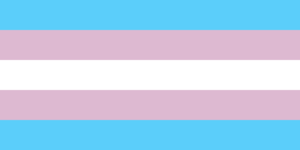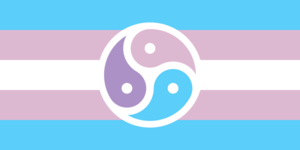Transgender Pride flag: Difference between revisions
(Created page with "{{Page-ok|07/20}}{{Header|Transgender Pride flag 07/20}} right|thumb|Transgender_Pride_flag image:Transgender_Bisexual_BDSM_Pride_Flag....") |
m (Text replacement - "{{Page-ok|07/20}}" to "") |
||
| Line 1: | Line 1: | ||
{{Header|Transgender Pride flag 07/20}} | |||
[[Image:Transgender_Pride_flag.png|right|thumb|Transgender_Pride_flag]] | [[Image:Transgender_Pride_flag.png|right|thumb|Transgender_Pride_flag]] | ||
[[image:Transgender_Bisexual_BDSM_Pride_Flag.png|right|thumb|Transgender_Bisexual_BDSM_Pride_Flag]] | [[image:Transgender_Bisexual_BDSM_Pride_Flag.png|right|thumb|Transgender_Bisexual_BDSM_Pride_Flag]] | ||
Revision as of 10:59, 1 December 2020
The Transgender Pride flag was designed by Monica Helms, and was first shown at a pride parade in Phoenix, Arizona, USA in 2000.
The flag represents the transgender community and consists of five horizontal stripes, two light blue, two pink, with a white stripe in the center.
Monica describes the meaning of the flag as follows:
The light blue is the traditional color for baby boys, pink is for girls, and the white in the middle is for those who are transitioning, those who feel they have a neutral gender or no gender, and those who are intersexed. The pattern is such that no matter which way you fly it, it will always be correct. This symbolizes us trying to find correctness in our own lives.
Other transgender symbols include the butterfly (symbolizing transformation or metamorphosis), and a pink/light blue yin and yang symbol is also used.
Chat rooms • What links here • Copyright info • Contact information • Category:Root

